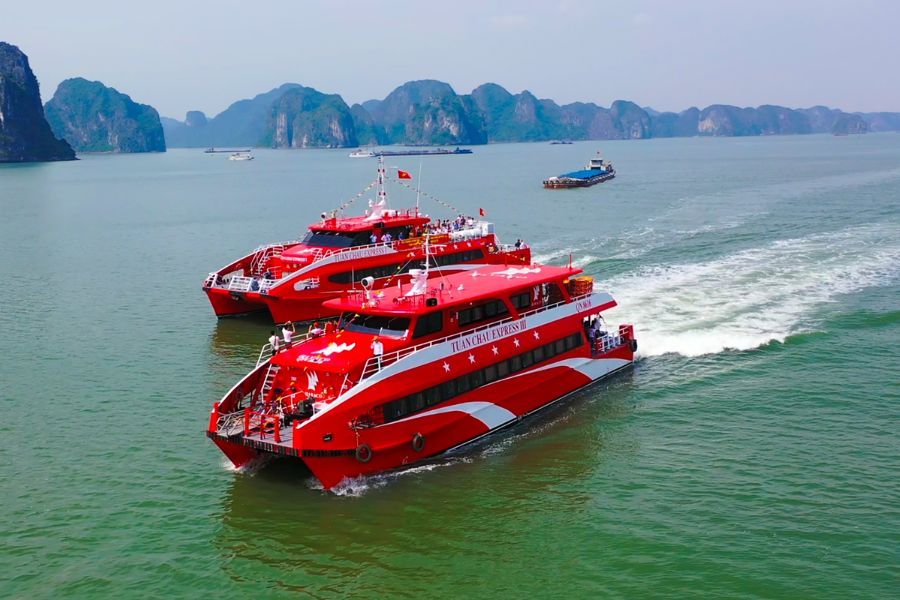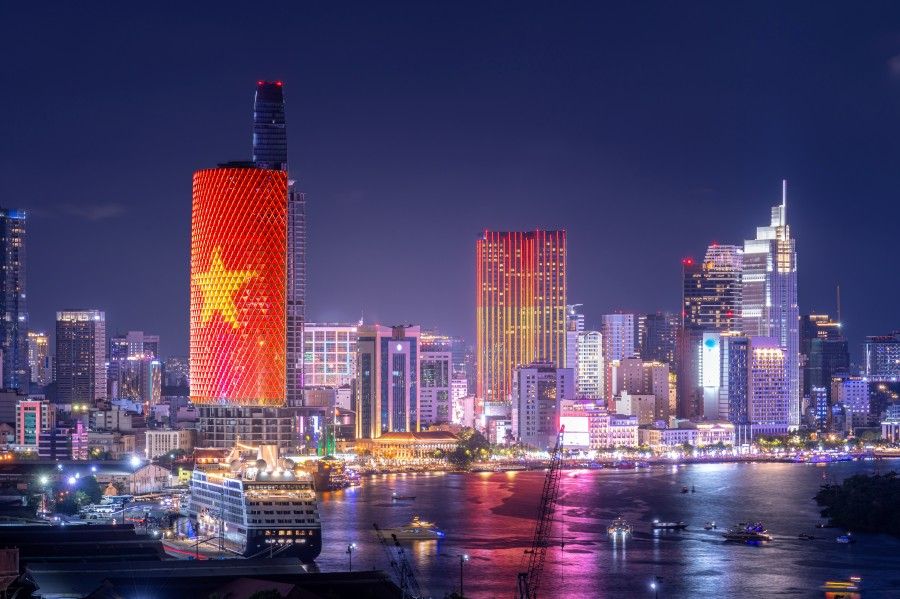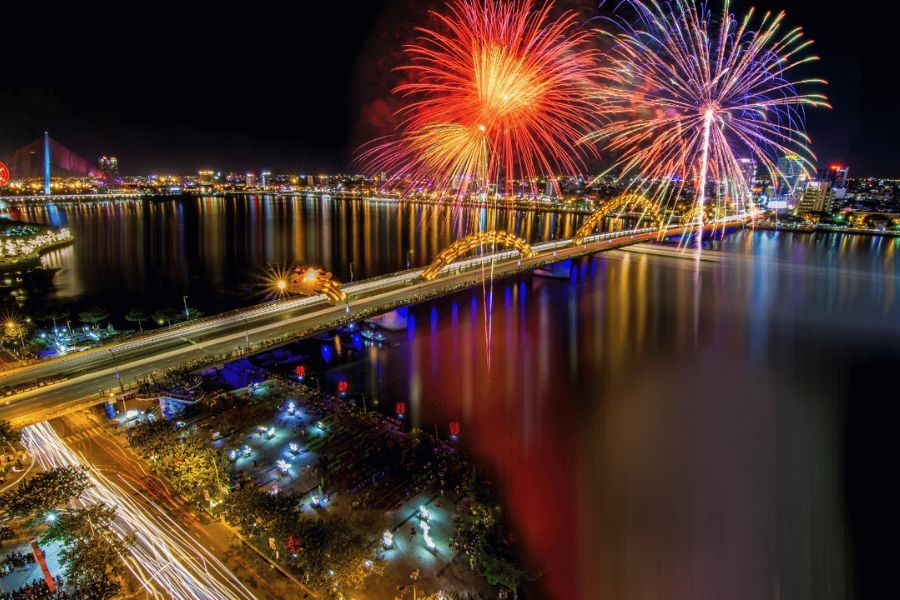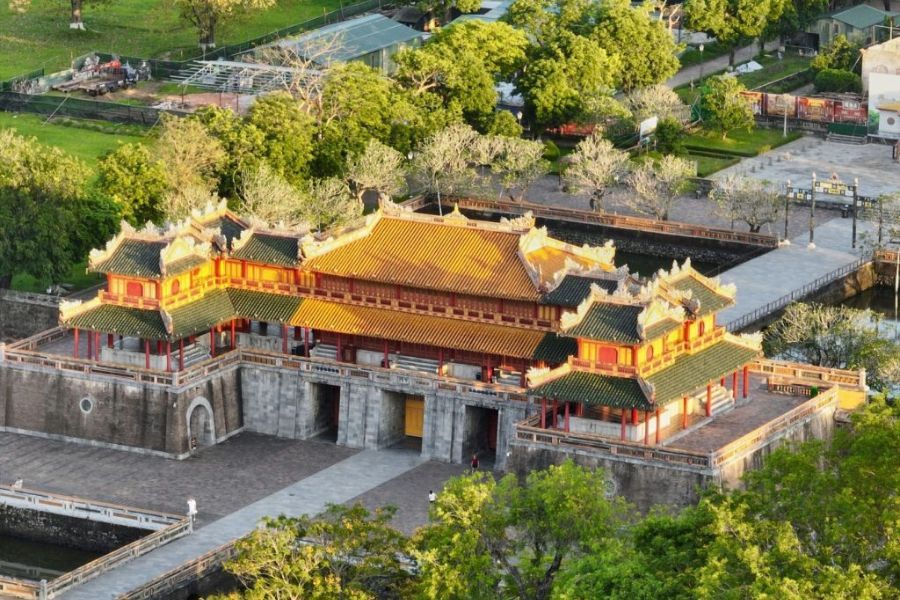From Halong Bay To Sapa: Sea To Summit Adventure Guide
Halong Bay and Sapa are two of Vietnam’s most iconic destinations. They provide a stunning contrast from karsts to mountains. This is a complete adventure guide about the route from Halong Bay to Sapa. Follow now!
Table of Contents
ToggleOverview of Halong Bay To Sapa
To most foreign visitors, what’s appealing about Vietnam is that you experience the country’s coastline just as much as the highlands. Halong Bay’s an on-the-rails vacation; you’re zipping by hundred-year-old karst peaks, spelunking in limestone caves, and canoeing through lagoons. Sapa seduces with its brisk mountain air, the radiant hues of the rice terraces, and the warm embrace of the Hmong, Dao, and Tay tribes. You can spend days on arduous hikes through breathtaking terrain, immersing yourself in the local culture and a lifestyle connected to nature.
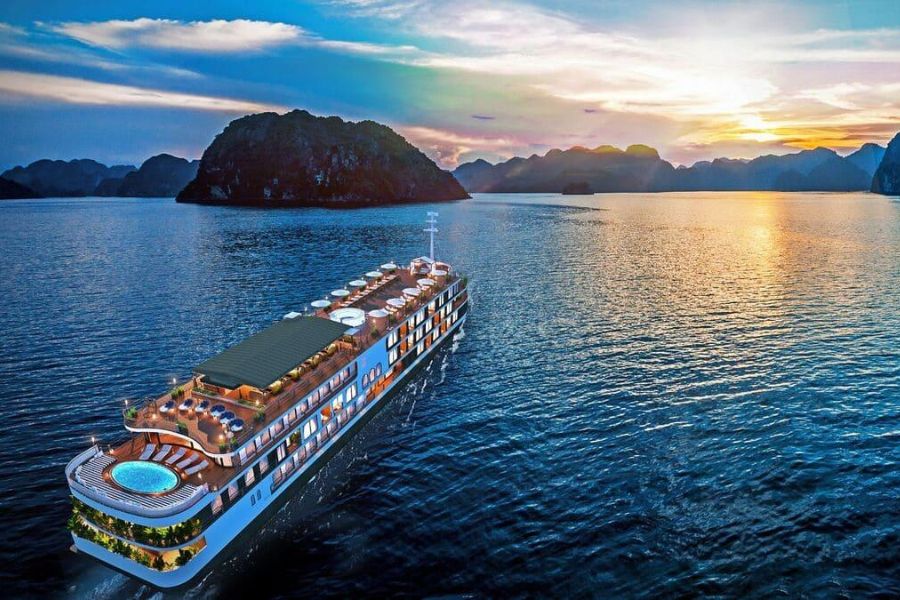
The journey from Halong Bay to Sapa is one of Vietnam’s preferred routes. A lot of travelers like to combine these two spots as they highlight Vietnam’s features from coastal marvels to highland splendor. The balance between Halong’s oceanic temptation and Sapa’s jagged peaks marks a perfect equilibrium for any Vietnam itinerary.
How Far Is It From Halong Bay To Sapa?
Halong Bay to Sapa distance is estimated to be 450 to 500 kilometers (280 to 310 miles). These distances slightly change based on where you start in Halong Bay, like Tuan Chau Island or Bai Chay, and where you end in Sapa town.
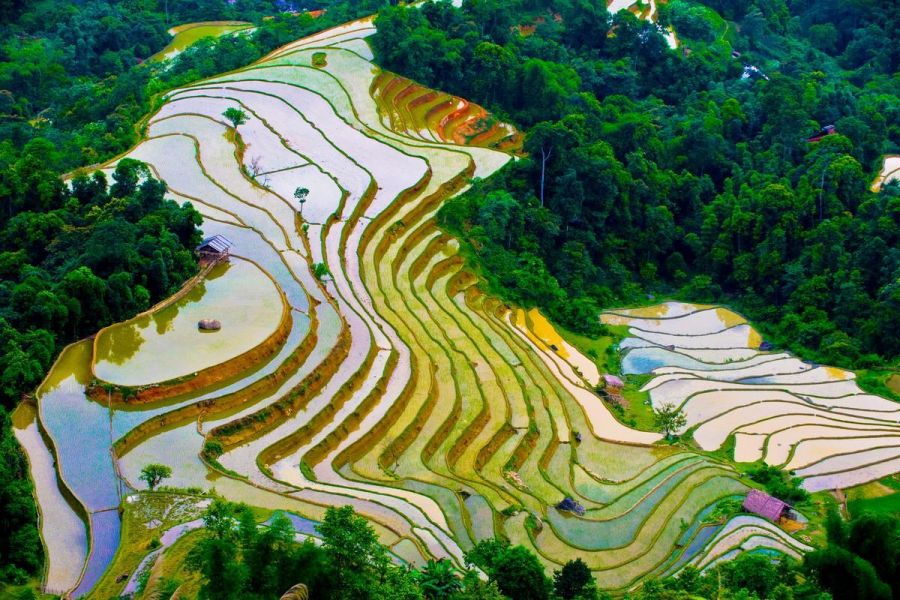
The usual time to travel this way is from 8 to 12 hours. If you’re driving on big roads, small local roads, and twisty paths up the mountains as you get to Sapa, this time might get longer. Also, this time can vary a lot based on the type of ride used, how many stops you make, and how the road and weather are at the time.
How to Travel From Halong Bay To Sapa?
When you schedule your excursion from the renowned Halong Bay to the beautiful Sapa, you have a lot of options for travel. Each provides a unique combination of cost, convenience, and ambiance. Consider your schedule and desire when choosing. Here are the applicable transport types you may select to journey to.
By Motorbike
For those who love adventure and freedom, motorbiking from Halong Bay to Sapa can be an exhilarating and satisfying choice. The most common and direct route involves riding west from Halong Bay towards Hanoi, then continuing north on major highways, eventually connecting to the Noi Bai-Lao Cai Expressway (CT05), which leads towards Lao Cai, the provincial capital near Sapa. From Lao Cai, it’s a stunning final ascent to Sapa.

This entire journey, spanning over 450 km, typically requires 10 to 14 hours of actual riding time. Most riders choose to break this journey into two days, with an overnight stop. Hanoi is a snug escape, but smaller hubs like Yen Bai or Lao Cai function effectively as pit stops. Prepare for some roads, from the relatively smooth highways to the winding and occasional not-so-safe mountain roads into Sapa.
| Factors | Details |
| Route | Ha Long – Noi Bai – Lao Cai Expressway (CT05) – Sapa |
| Travel time | 10 – 14 hours |
| Rental cost | 150,000 – 250,000 VND/day |
Safety tips:
- Always wear a helmet
- Check your brakes, lights, and tires before departure
- Pack a raincoat
- Don’t ride at night.
- Maintain liquids and schedule a gas stop.
By Bus Or Minivan
For travelers who prefer their utmost convenience, security, and are free from other tensions, it is the most preferred and economical means of transportation. Although Halong Bay to Sapa bus routes are becoming common, most routes still connect in Hanoi. Green Bus Tourist Transport, HK Buslines, Daiichi Travel, and maybe others found via booking platforms are reputed names in the business.
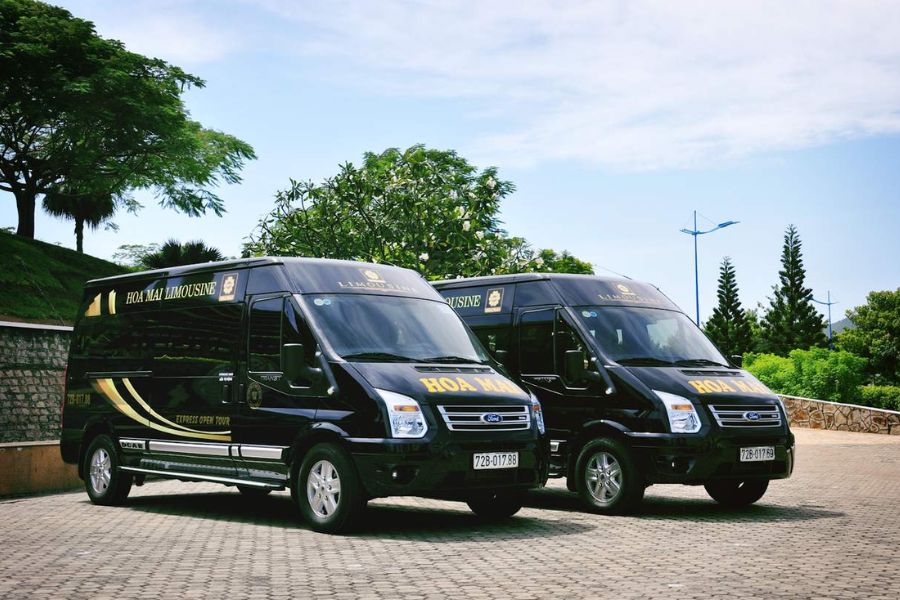
For the more luxurious sort, watch for the ‘limousine minivans’; fewer seats, more legroom, treats like wifi, and water should be down there on the list. Generally, these will be under names like EcoSapa Limousine or something similar. Recommended, however, is that you check out schedules and routes, as services may be subject to change.
A typical bus/minivan ride will take 8 to 12 hours. Being a layover in Hanoi, do also consider the potential waiting time. The Halong Bay to Sapa sleeper bus is a fantastic option, allowing you to depart in the evening, sleep during the journey, and wake up refreshed in Sapa.
| Factors | Details |
| Standard seated or sleeper bus | 350,000 VND to 600,000 VND |
| Limousine minivan | 600,000 VND to 1,000,000 VND |
| Travel time | 8 to 12 hours |
| Operators | Green Bus Tourist Transport, HK Buslines, Daiichi Travel |
By Private Car
Private cars offer the best option for comfortable, fast, and flexible transportation from Halong Bay to Sapa; they are suited to families, small groups, or anyone with special travel considerations. Being transferred in a private car offers wonderful air-conditioned comfort, ample legroom, and utmost privacy. It also confers the luxury to choose when you want to leave and request multiple stoppages for washroom breaks, meals, or photo opportunities along the way.

Private cars make the fastest door-to-door trip possible because they do not have to make scheduled stops for other passengers or stick to a fixed route. Most often, the driver will also be able to pick the best routes to save travel time. Hence, if you want to have a meticulously planned trip down to the last detail, are not comfortable with public transport schedules, or have very special luggage to take along, this option is the perfect solution.
| Factors | Details |
| Price | 3,500,000 VND to 6,500,000 VND |
| Travel time | Around 8 to 10 hours |
| Special treats | Door-to-door service, air-conditioned vehicle, flexible schedule. |
By Train
Although there is no direct Halong Bay to Sapa train, many travelers still seek the experience of an overnight train ride. As a result, they often take a train from Hanoi to Lao Cai and then continue to Sapa by other means of transport.
The first step is to return to Hanoi from Halong Bay, which can be done by bus or private vehicle and usually takes 2.5 to 3.5 hours. From Hanoi, you get on a night train to Lao Cai, the nearest train stop to Sapa. This part of the trip lasts about 8 to 9 hours. Trains leave from Hanoi’s Tran Quy Cap stop (part of Hanoi Railway Station) at night and get to Lao Cai early the next morning. Many train firms run this way, from the simple Vietnam Railways to fancy, tourist-focused trains like Livitrans Express, Sapaly Express, Chapa Express, or Victoria Express.
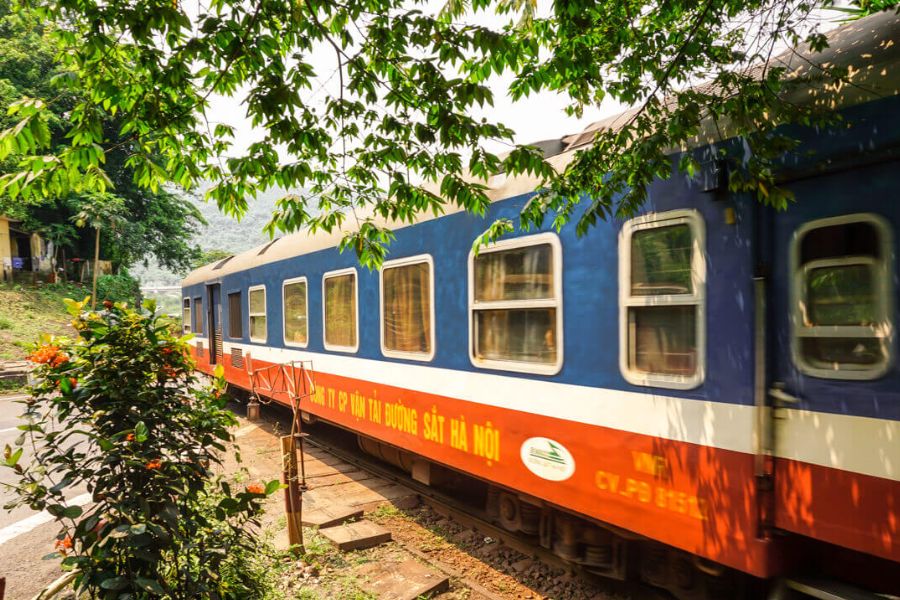
You will have to finish the last part of your trip to Sapa once you get to Lao Cai station. You can take a private cab, shared minivan, or local public bus to make the 30- to 45-minute climb up the mountain. Outside the station, shared minivans are easily accessible and reasonably priced.
| Factors | Details |
| Travel time | 11 – 13 hours in total |
| Prices |
|
| Routes | Halong Bay – Hanoi – Lao Cai – Sapa |
Tips For Traveling From Halong Bay To Sapa
Taking the time to plan your journey can really make all the difference, especially when visiting these amazing places. Here are some friendly tips to help you create unforgettable memories on your trip.
- Best time to go: Depart in the early morning if you’re taking a bus or private car to avoid nighttime driving. If you’re on a sleeper bus/overnight train, you can sleep through the journey.
- Booking: It is highly recommended to book your bus, minivan, or train tickets well in advance. You can usually do this via your hotel, a local travel agency, or trustworthy online booking sites like SeniWorld. Booking ahead means not just guaranteeing you a place, but usually picking your seats or sleeper berths.

- Safety: People who ride bikes must put safety first. They need to wear helmets, safe clothes, and bring a first aid kit. Look at the weather before you go and wait if it seems like there will be a lot of rain or fog.
- Split the trip: Think about staying a day or two in Hanoi on the way. This lets you see the city, rest, and then go on to Sapa feeling better.
- Clothing: Because the temperatures in the hilly Sapa and the seaside Halong Bay differ greatly, bringing layers of clothing. Pack rain gear, cozy walking shoes, and warm jackets. Because mountain weather is subject to sudden changes, preparedness is crucial.
- Offline maps: Use your smartphone to get offline maps of Sapa and Halong Bay, along with the path between them. If you need to travel into uncharted territory or lose signal, this can be quite helpful.
Recommended Stops Along the Way
If you’re driving your own car, limo, or motorbike, you can make a few great pit stops along the way. These stops can transform your long haul into a cultural and scenic road trip.
Viet Tri
Viet Tri is home to Van Lang, the first capital of Vietnam. It is most famous for the Hung Kings Temple Complex, a revered spiritual site dedicated to the mythical founders of Vietnam. The complex is nestled on Nghia Linh Mountain and offers tranquil temples, pagodas, and lush surroundings. Each year, thousands of visitors come here, particularly during the Hung Kings Festival, to pay respect to their ancestry.
Mu Cang Chai
If you want to reach Mu Cang Chai, it takes a significant detour (adding a few hours to your journey). However, Mu Cang Chai is world-famous for its spectacular, awe-inspiring terraced rice fields. These magnificent landscapes have been carved into steep mountainsides by the H’mong people for centuries. The best time to visit is during the transplanting season (May-June) when the fields shimmer with water, or, more famously, during the harvest season (mid-September to mid-October) when the paddies turn a breathtaking golden hue.

Nghia Lo
A little further along the path into the mountainous northwest, Nghia Lo (Yen Bai) is a peaceful town in the large Muong Lo Valley. Its terraced rice fields are somewhat famous too, though maybe not as much as Mu Cang Chai, and they’re stunning, possibly even more so because there are fewer crowds. It’s home to a significant Thai ethnic minority, so you’ll have opportunities to learn about their unique culture, traditional stilt houses, and delicious food. It could be a quiet overnight stop before continuing on to Sapa.
Hanoi
Most travelers pass through Hanoi when traveling from Halong Bay to Sapa. It’s a good time to see Vietnam’s big city. Plan to stay for a day or two in Hanoi to feel its deep past, fun street food life, and mix of French and Vietnamese style in buildings. The Old Quarter has narrow roads full of old stores, street sellers, and aged holy places. Hoan Kiem Lake gives a calm break in the city’s heart, and the Temple of Literature shows off Vietnam’s school past. Food fans can try known foods like Pho (Vietnamese noodles), Bun Cha (grilled pork with noodles), and egg coffee in real spots.
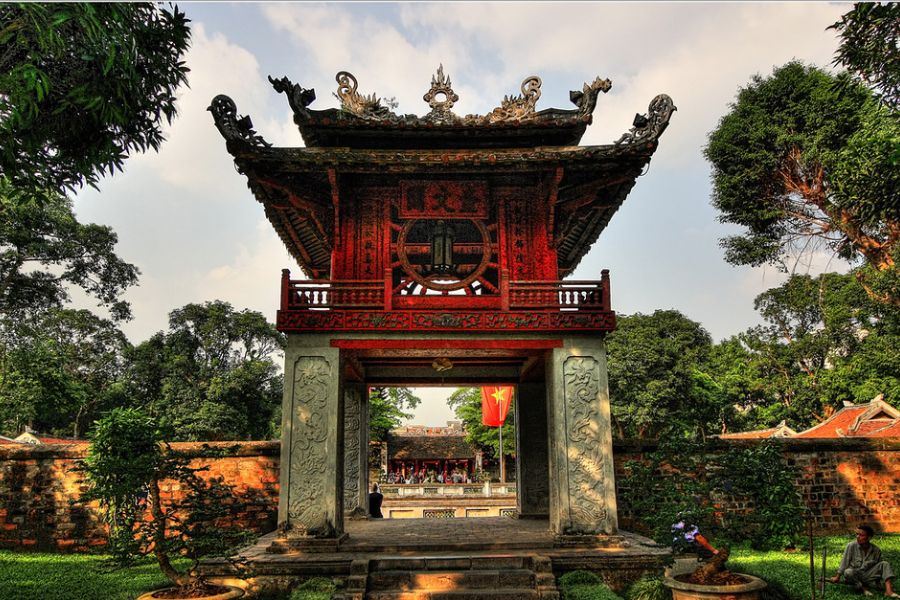
Final Thoughts
The journey from Halong Bay to Sapa is mystical, with the emerald waters of Halong Bay to the serene, terraced mountains of Sapa. It’s an immersive experience that highlights the incredible geographical and cultural diversity of Vietnam. Each brings a new perspective to this captivating world. With some thought and choosing what suits your style of travel, you’re well on your way to an unforgettable experience. Let SeniWorld be your trusted partner in crafting bespoke travel experiences throughout Vietnam, ensuring every moment of your adventure is seamless and truly remarkable.








